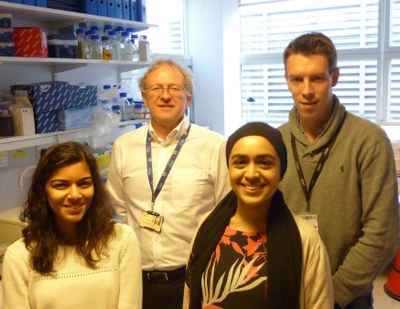Nahorski MS, Maddirevula S, Ishimura R, Alsahli S, Brady AF, Begemann A, Mizushima T, Guzmán-Vega FJ, Obata M, Ichimura Y, Alsaif HS, Anazi S, Ibrahim N, Abdulwahab F, Hashem M, Monies D, Abouelhoda M, Meyer BF, Alfadhel M, Eyaid W, Zweier M, Steindl K, Rauch A, Arold ST, Woods CG, Komatsu M & Alkuraya FS. Biallelic UFM1 and UFC1 mutations expand the essential role of ufmylation in brain development. Brain 141(7):1934-1945 (2018).
Schon K, Parker A, Woods CG. Congenital Insensitivity to Pain Overview.
In: Adam MP, Ardinger HH, Pagon RA, Wallace SE, Bean LJH, Stephens K, Amemiya A, editors. GeneReviews® [Internet]. Seattle (WA): University of Washington, Seattle; 1993-2018.
Chavali PL, Stojic L, Meredith LW, Joseph N, Nahorski MS, Sanford TJ, Sweeney TR, Krishna BA, Hosmillo M, Firth AE, Bayliss R, Marcelis CL, Lindsay S, Goodfellow I, Woods CG, Gergely F. Neurodevelopmental protein Musashi-1 interacts with the Zika genome and promotes viral replication. Science 357(6346):83-88 (2017).
Shaikh SS, Chen YC, Halsall SA, Nahorski MS, Omoto K, Young GT, Phelan A, Woods CG. A Comprehensive Functional Analysis of NTRK1 Missense Mutations Causing Hereditary Sensory and Autonomic Neuropathy Type IV (HSAN IV).
Hum Mutat. 38(1):55-63 (2017).
Nahorski MS, Asai M, Wakeling E, Parker A, Asai N, Canham N, Holder SE, Chen YC, Dyer J, Brady AF, Takahashi M, Woods CG. CCDC88A mutations cause PEHO-like syndrome in humans and mouse. Brain 139(Pt 4):1036-44 (2016).
Nahorski MS, Al-Gazali L, Hertecant J, Owen DJ, Borner GH, Chen YC, Benn CL, Carvalho OP, Shaikh SS, Phelan A, Robinson MS, Royle SJ, Woods CG. A novel disorder reveals clathrin heavy chain-22 is essential for human pain and touch development. Brain 138(Pt 8):2147-60 (2015).
Nahorski MS, Chen YC, Woods CG. New Mendelian Disorders of Painlessness.
Trends Neurosci. 38(11):712-724 (2015).
Waxman SG, Merkies ISJ, Gerrits MM, Dib-Hajj SD, Lauria G, Cox JJ, Wood JN, Woods CG, Drenth JPH, Faber CG. Sodium channel genes in pain-related disorders: phenotype-genotype associations and recommendations for clinical use. Lancet Neurol. 13(11):1152-1160. doi:10.1016/S1474-4422(14)70150-4 (2014)
Chen YC et al. Transcriptional regulator PRDM12 is essential for human pain perception. Nature Genet. 47, 803–808 (2015).
Nahorski MS, Al-Gazali L, Hertecant J, Owen DJ, Borner GH, Chen YC, Benn CL, Carvalho OP, Shaikh SS, Phelan A, Robinson MS, Royle SJ & Geoffrey Woods C. A novel disorder reveals clathrin heavy chain-22 is essential for human pain and touch development. Brain 138, 2147–2160 (2015).



